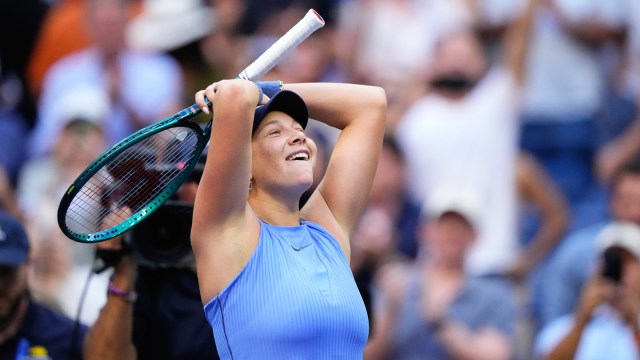ARTICLE AD BOX
 Anisimova proved that she would not be defined by the memories of her painful Wimbledon rout, where she lost the final 6-0, 6-0 (Double Bagel) to Swiatek, as she beat the second-seed of the event 6-4. 6-3. (Photo: AP)
Anisimova proved that she would not be defined by the memories of her painful Wimbledon rout, where she lost the final 6-0, 6-0 (Double Bagel) to Swiatek, as she beat the second-seed of the event 6-4. 6-3. (Photo: AP)
Facing up to failure and taking a good hard look at oneself is often the first step to success. That’s exactly what Amanda Anisimova did to bounce back from a double bagel in a Wimbledon final to achieve what she called “the most meaningful victory of my life.”
The American was thrashed 6-0, 6-0 by Iga Swiatek in the summit clash at SW19 a little over a month and a half ago, but turned the tables on the Polish second seed in the US Open quarterfinals, prevailing 6-4, 6-3 at the Arthur Ashe Stadium.
Anisimova has struggled with mental health issues in the past, having had to take a break from the sport, but showed admirable resolve to come out on the right side of a high-quality contest. But the turnaround began by revisiting some unpleasant match footage.
“I watched them [highlights] back, as painful as it was, just to see what I can avoid or what went wrong,” Anisimova said after her passage to the semifinals, where she will face former champion Naomi Osaka of Japan.
“Then afterwards I had to watch some good highlights to remove that from my brain!”
The 24-year-old said the drubbing at Wimbledon had not left any long-term scars.
“I feel like I was able to bounce back from it really quickly. Maybe a few years ago I wouldn’t have done as well as I have this time. I would have maybe blamed myself more or held on to the guilt for longer,” she felt.
Story continues below this ad
“On the court I was crying, and maybe [for] 30 minutes afterwards, but then I got on the phone with someone and I kind of laughed it off. At the end of the day, it was just tennis.”
Positive reinforcements
Anisimova’s positive reinforcements helped in the turnaround.
“I made a point to myself, and also maybe to other people, that if you really put a positive mindset out there, then you can have a positive outcome.”
She diverted her thoughts to the spectators who had spent a lot of money to watch the Wimbledon women’s singles final, and didn’t get to see a worthwhile contest.
Story continues below this ad
“Truly, the most that I felt bad was for the people that had come to watch that day,” she said. “I know how much people pay for those tickets and are excited to see Wimbledon. I kind of had that guilt on my back, as opposed to winning my first Grand Slam final.”
Finding happiness outside the tennis court has played a part in Anisimova dealing better with challenges on it.
“I’m in a really good place in my life. I’m happy every single day, which I wasn’t a couple of years ago,” she felt.



.png)
.png)
.png)
























 English (US) ·
English (US) ·